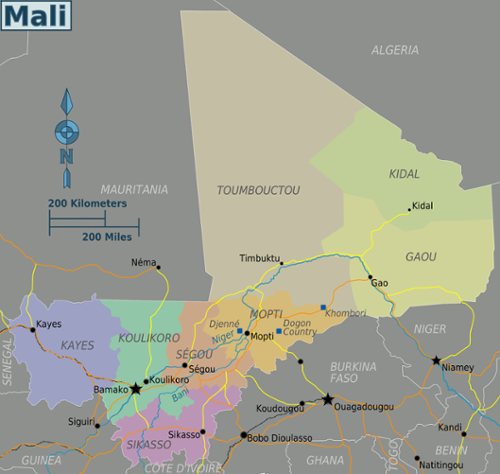Week Three
This week was another short week at USIP thanks to the holiday weekend, which I used to go back to Williamsburg to be with my dog. During the week, I spent my time continuing to research the security situations in the six west African countries in my portfolio, developing outlines explaining the security apparatus, applicable law, actual operation in reality, and security environments in each country. These outlines will be used as reference guides for future work and will be incorporated into reports to be published this summer. Given resource constraints, some are more detailed than others, particularly my work on Mali.

Interestingly a lot of the background information that I learned about Mali came from my reading in my spare time. Two weekends ago, I picked up a copy of The Bad-ass Librarians of Timbuktu, a non-fiction book reporting on the heroic efforts of a handful of people who managed to save more 375,000 of Timbuktu’s ancient manuscripts from the armed terrorist groups that took over the city in 2012. Little did I know that the book would explain in exacting detail all of the information about the conflict and its actors that I would need to know to write my report on Mali’s security sector. When it comes to foreign research, information really can be found in the most unlikely places.
Mali has a long history of practicing Sufism, a moderate and tolerant school of Islam, and Timbuktu has an equally long history of scholarship and philosophy. Timbuktu, which is isolated in the northern region of the country along the Niger River, served as a center of scholarship at various points during the medieval period through the eighteenth and nineteenth centuries. During that time, hundreds of thousands of religious, philosophical, and scientific texts were created.
This heritage, along with the lives and safety of thousands of people, were endangered when conflict erupted in Mali in 2012. The conflict arose due to a variety of factors, including regional instability (particularly the fall of Gaddafi in Libya and the rise of armed extremist groups), longstanding tensions with Tuareg separatists in the North, and the slow disintegration of the government and military that led to a coup d’etat in 2012. Within a matter of months, three armed extremist groups (al-Qaeda in the Islamic Maghreb, Ansar Dine, and the Movement for Oneness and Jihad in West Africa (MUJAO)) and secular Tuareg separatists, seized the Kidal, Gao, and Timbuktu regions.
With the exception of the secular Tuareg separatists, the entities controlling this territory espoused and imposed an extreme interpretation of Islam and Sharia law. During this time, amputations were used as punishment for suspected thefts, unmarried couples were sentenced to stoning, and executions were carried out. In addition to the human atrocities, cultural abuses were committed as well. Multiple religious sites were destroyed because the armed group’s interpretation of Hadith did not permit the worship of idols or saints, which these sites honored. Thus, Timbuktu’s wealth of tolerant, moderate, and interdisciplinary manuscripts were in danger of being destroyed. Unfortunately, a few thousand were destroyed.

In its attempt to turn Mali into an Islamic state, the coalition of extremist forces began moving South towards the capital of Bamako and took the city of Konna (in the center of the country). This drew the attention of the western world, resulting in a French military intervention that broke the armed groups’ control of the northern territory. Although the military intervention succeeded in ending their territorial control, the armed groups remained (for the most part) intact. Today they continue to threaten the security of Mali and it’s neighboring countries. Burkina Faso, Niger, Nigeria, and Senegal are all combating the security threat posed by these forces. The porous nature of their borders, due both to lack of resources to secure them and a culture of petty bribe-taking among border patrol and customs officers, makes movement and the spread of terrorism across the region easy. Thus, the insecurity began as a coup d’etat in Libya and evolved into an attempted take over in Mali, has spread throughout the region.
It’s concerning, heartbreaking, and yet fascinating to analyze the situations in these states and to see how they are connected. Next week, I’ll be helping to draft the country reports explaining the outcomes of the JSD project.
Photo Credit: By Peter Fitzgerald - Own work based on the UN map of Mali and [1]UN Maps derivedThis image is derived from products of the United Nations Cartographic Section. Modified versions of UNCS maps may be used provided that the UN name and reference number do not appear on any modified version, and a link to the original map is provided.UN Maps derived, CC BY-SA 3.0, https://commons.wikimedia.org/w/index.php?curid=18450654